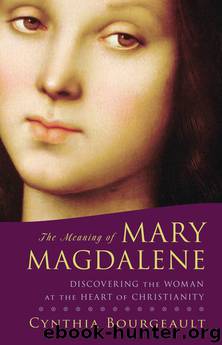The Meaning of Mary Magdalene by Cynthia Bourgeault

Author:Cynthia Bourgeault
Language: eng
Format: epub
Publisher: Shambhala Publications
12
Substituted Love
There is no greater love than this, to give one’s life for one’s friends.
—JOHN 15:13
THERE IS ONE other aspect of the path of conscious love I have not yet mentioned, although really it is the most important of all. At that point where the line of kenosis, self-surrendering love, intersects with the line of exchange, the free flow of all things, there we find the practice of substituted love. And in substituted love the meaning of the entire path becomes exquisitely clear.
The idea of “substituted love” is one of the theological cornerstones of the work of Charles Williams, that remarkable British Christian mystic of a generation or two ago. What he means by the term is actually quite simple: the bearing of burdens. One person voluntarily chooses to carry the burden of the other person, so that the other is relieved of carrying it. If I carry my elderly neighbor’s heavy bag of groceries from the market, then she does not have to carry it herself. Fundamentally, it is as simple as that.
The complexity enters, of course, when this simple, concrete notion is transported to the psychological and spiritual realms. If I bear another person’s emotional pain in their place—if I voluntarily take on their fear or neurosis—does this mean they are relieved of carrying it? If I voluntarily agree to carry another person’s guilt or crime, if I take the punishment in their place, does that mean they are relieved of it?
Most psychologists and spiritual teachers would say “no.” One person’s actions can ease the burden for another, can bring clarity and support, imbue the other with courage and strength, and sometimes even confer baraka, a direct transmission of spiritual energy that temporarily raises their state. But in the end, we each carry our own burdens, our own karma. “Every mutton hangs by its own leg,” my Sufi teacher, the son of a butcher, insisted.
Charles Williams thought “yes.” He believed that this total bearing of another’s burden was not only completely possible within a Christian self-understanding, but in fact held the key to Jesus’s luminous life and death. Again and again he returns to this theme in his novels, as he lays out the lineaments of what he somewhat curiously refers to as his “theology of romantic love.”1 In Williams’s 1937 novel Descent into Hell, the poet Peter Stanhope willingly takes on the neurotic terror of his neighbor Pauline, so that she finds herself released from it. In the 1945 novel All Hallows’ Eve, Lester rescues her friend Betty from a vicious attack of black magic when she willingly stands by the bedside of the sleeping Betty and allows the spell to fall on her instead. “Mystical substitution” (as he sometimes also names it) is at the heart of Williams’s understanding of mature Christian love and of the “way of exchange” that Jesus has called us to.
But why “romantic love”? Because, I believe, like so many others we have heard from in these chapters, Williams could sniff that
Download
This site does not store any files on its server. We only index and link to content provided by other sites. Please contact the content providers to delete copyright contents if any and email us, we'll remove relevant links or contents immediately.
MOSES THE EGYPTIAN by Jan Assmann(2411)
Jesus by Paul Johnson(2352)
Anthology by T J(2206)
The Plantagenets by Dan Jones(2085)
Jesus of Nazareth by Joseph Ratzinger(1807)
By Design by J.A. Armstrong(1538)
The Courage to Be Happy by Ichiro Kishimi & Fumitake Koga(1399)
Saints for All Occasions by J. Courtney Sullivan(1374)
1916 in 1966 by Mary E. Daly(1281)
Abraham by James Reapsome(1232)
Who's Who in the Age of Jesus by Geza Vermes(1226)
Our Revolution by Bernie Sanders(1223)
Abraham by David Rosenberg(1209)
Global Crisis by Parker Geoffrey(1154)
Crusade + Other Stories (Getting Started) by unknow(1136)
Photographing Families by Unknown(1131)
The Hare with Amber Eyes by Edmund de Waal(1116)
Stars by Sophia Bennett(1114)
Jesus: The Human Face of God (Icons) by Jay Parini(1089)
